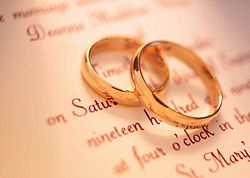March 1, 2012

|
After 40 years of decline, the number of weddings has risen by 3.7 per cent in a year.
Analysts believe the recession has caused a return to
family values and a desire for the stability marriage
offers.
Data released by the Office of National Statistics showed there were 241,100 weddings in England and Wales in 2010, the most recent year for which figures are available.
This is 8,657 more than in the previous year, and provides
welcome ammunition for campaigners who are trying to push
David Cameron into keeping his promise to give a tax break
to married couples.
The new data follows fresh evidence of the benefits of marriage from the first results of the Prime Minister's attempt to measure the nation's happiness.
Figures published this week showed that married people are the happiest, their sense of well-being higher than that of cohabitees and far higher than that of the single, divorced or separated.
Church of England weddings went up by 4 per cent in 2010 thanks to rules which allow couples a wider choice of churches than was available under the old system, which tied a bride and groom to the parish where they live.
However other Christian denominations saw a fall of 1.1 per cent in their wedding numbers. There were even bigger drops in religious weddings staged by other faiths.
Together, the number of Sikh, Muslim and Jewish weddings went down by 3.4 per cent. Two out of three of all civil weddings are now celebrated in stately homes, hotels, golf clubs or football-ground hospitality suites which have been allowed to stage ceremonies since 1995.
The popularity of a wedding in a venue technically known as 'approved premises' means 124,570 were held in them in 2010, a 12 per cent increase in a single year. This is more than three times the number in register offices.
By 2009, the number of weddings was at the lowest since Queen Victoria was on the throne.
In general the popularity of marriage has been on the wane since 1972 – just after liberal divorce reforms came into operation which made it possible to end a marriage in six months.
At the time there were more than 400,000 weddings a year in England and Wales.
The ONS said economic pressures could be behind the increase in 2010. 'During tough economic times, people seek stability and family may be valued more highly than material goods. As parents could be out of work, they may have more time to spend on child rearing.'
If this thinking is right, it means many people still instinctively put marriage at the heart of family life – a view not shared by politicians such as Deputy Prime Minister Nick Clegg.
He said in December that marriage was outmoded and that 'we need to get away from the idea that there is something on a piece of paper that says if you are married, that's good, if you're not married, that's not'.
The ONS report also said that couples whose lives had been disrupted in the first years of the recession, or who had to put off marriage because of money pressures, could have been catching up in 2010.
Other reasons put forward to explain the rise included a drop in the number of couples marrying abroad – another result of the recession – and an increase in numbers of older cohabiting couples deciding it was time to put their relationships on a firmer legal footing.
The rise might also be attributable to immigration. Around 600,000 migrants come to live in Britain each year and have a high regard for marriage.
All available academic research has long shown that married couples are better off and healthier than others, and that their children too are healthier and do better at school.
The new count showed that for every 1,000 single people over 16, 8.7 were married in 2010, up from 8.5 in 2009.
Couples were most likely to marry between the ages of 25 and 29, but the biggest percentage increases in marriage numbers came among men in their late 40s and women in their early 30s.
Two out of three weddings were first marriages for both bride and groom.
The increase was the third rise in marriage numbers in the past decade. Between 2002 and 2003 there was a 5.7 per cent rise, and there was a further very small increase between 2007 and 2008.
The ONS believes a decline in 2004 was caused by new laws clamping down on sham marriages to get around immigration laws.
The ONS report said: 'It is not possible to determine at this stage whether the rise in the provisional number of marriages in 2010 signifies an end to the long-term decline of marriages or whether such increases will continue.'
